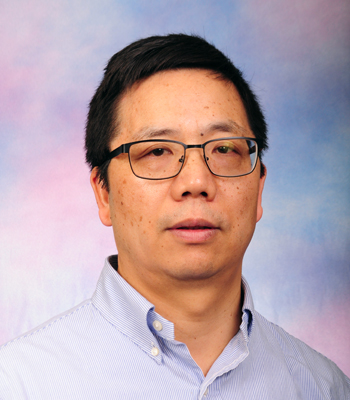Gen Wu, Ph.D.
Address
421 E. Canfield Street, Suite 1106 Detroit, MI 48201Office address
421 E. Canfield Street, Suite 1106
Detroit, MI 48201
Mentoring
Julio Pimentel (Graduated 6/14/2023)
Department
Oncology
Research interests
- MAPKs and their phosphatases in cancer cells
- TRAIL signaling and resistant mechanisms
- Chemosensitivity and drug resistance
Research description
My research interests are to understand the mechanisms of deregulated cell death pathways in human cancer and then target related pathways for the improvement of cancer therapies. Specifically, we focus on two areas. (1) We study the mechanisms of tumor necrosis factor (TNF)-related apoptosis-inducing ligand (TRAIL) resistance. TRAIL is a member of the TNF family that selectively induces apoptosis of cancer and transformed cells, but not normal cells. However, many cancer cells are resistant to TRAIL and the underlying mechanisms are not fully understood. We are currently studying how cancer cells acquire resistance to TRAIL. (2) Another interest is the regulation of mitogen-activated protein kinase (MAPK) phosphatase-1 (MKP-1) in cancer cells. MKP-1 is a member of the dual-specificity protein phosphatase family and an endogenous negative regulator of MAPK signaling. MKP-1 can dephosphorylate and inactivate all three major MAPKs, including JNK, p38 and ERK. MKP-1 is overexpressed in many cancer types and may regulate cancer cell drug resistance. It is established that the activation of MAPKs plays a critical role in the response of cancer cells to therapies. We are studying how MKP-1 inactivates MAPKs to impact cancer cell death.
Selected publications
Pimentel, J.M., Zhou, J.Y., Kim, S., Gurdziel, K., Wu, G.S. The role of the immune response and inflammatory pathways in TNF-related apoptosis-inducing ligand (TRAIL) resistance in triple-negative breast cancer cells. Am J. Cancer Res. 2023 Oct 15;13(10):4678-4692.
Pimentel, J.M., Zhou, J.Y., Wu, G.S. The role of TRAIL in apoptosis and immunosurveillance in cancer. Cancers 2023, 15(10), 2752.
Pimentel, J.M., Zhou, J.Y., Wu, G.S. Regulation of programmed death ligand 1 (PD-L1) expression by TNF-related apoptosis-inducing ligand (TRAIL) in triple-negative breast cancer cells. Mol Carcinog. 2023 Feb;62(2):135-144.
Uddin MH, Zhou JY, Pimentel J, Patrick SM, Kim S, Shekhar MP, Wu GS. Proteomic Analysis Identifies p62/SQSTM1 as a Critical Player in PARP Inhibitor Resistance. Front Oncol. 2022 Jun 29;12:908603. doi: 10.3389/fonc.2022.908603. eCollection 2022.
Uddin, M.H., Pimentel, J.M., Chatterjee, M., Allen, J.E., Zhuang, Z., Wu, G.S., Targeting PP2A inhibits the growth of triple-negative breast cancer cells. Cell Cycle. 2020;19:592-600.
Kho, D.H., Uddin, M.H., Chatterjee, M., Vogt, A., Raz, A., Wu, G.S. GP78 cooperates with dual-specificity phosphatase 1 to stimulate epidermal growth factor receptor-mediated extracellular signal-regulated signaling. Mol Cell Biol 2019;39:e00485-18.
Obrist, F., Michels, J., Durand, S., Chery, A., Pil, J., Levesque, S., Joseph, A., Astesana, V., Pietrocola, F., Wu, G.S., Castedo, M., Kroemer, G. Metabolic vulnerability of cisplatin-resistant cancers. EMBO J. 2018;13;37.
Yuan, X., Gajan, A., Chu Q., Xiong, H., Wu, K., Wu, G.S. Cancer Metastasis Rev. 2018 Mar 14. [Epub ahead of print]
Wang J, Kho DH, Zhou JY, Davis RJ, Wu GS. MKP-1 suppresses PARP-1 degradation to mediate cisplatin resistance. Oncogene. 2017;36:5939-47.
Yuan, X., Kho, D., X, J., Gajan, A., Wu, K., Wu, G.S. ONC201 activates ER stress to inhibit the growth of triple-negative breast cancer cells. Oncotarget. 8(13): 21626-38, 2017.
Complete List of Publications:
Education/training
PhD (1992): Peking Union Medical College, Beijing, China
Post-Doc (1993-1995): University of Pittsburgh School of Medicine, Pittsburgh, Pennsylvania
Post-Doc (1995-1999): Howard Hughes Medical Institute at University of Pennsylvania, Philadelphia, Pennsylvania
